Daily Vocabulary Words: List of Daily Used Words in Leading Indian Newspapers
Hi there. Welcome to this special section @ Wordpandit. Our endeavour here is straightforward: highlighting daily vocabulary words that you would come across in leading newspapers in the country. We have included the following newspapers in our selection:
• The Times of India
• The Economic Times
• Hindustan Times
• Mint
• Indian Express
We are putting in extensive work to develop your vocabulary. All you have to do is be regular with this section and check out this post daily. This is your repository of commonly used words; essentially, we are posting a list of daily used words. Hence, this has significant practical application as it teaches you words that are commonly used in leading publications mentioned above.
Visit the website daily to learn words from leading Indian newspapers.
WORD-1: Disharmony
CONTEXT: Where any rabble-rousing attempts to spread enmity and disharmony between communities are fiercely resisted.
SOURCE: Hindustan Times
EXPLANATORY PARAGRAPH: Think about when you and your friend want to play different games and can’t agree. That’s like disharmony. It’s when people or things don’t get along well or don’t fit together nicely.
MEANING: Lack of harmony or agreement; conflict (noun).
PRONUNCIATION: dis-HAR-muh-nee
SYNONYMS: Discord, Disagreement, Conflict, Strife, Friction
USAGE EXAMPLES:
1. There was disharmony in the team, leading to poor performance.
2. The different colors in the room created a sense of disharmony.
3. Disharmony between the partners led to the business’s downfall.
4. The siblings often experienced disharmony over small issues.
WORD-2: Ostensibly
CONTEXT: The scenario poses a dilemma for India. New Delhi is keen to contribute to the US-led endeavor but ostensibly wary of taking on the Houthis, who are, by all accounts, capable combatants.
SOURCE: Indian Express
EXPLANATORY PARAGRAPH: Imagine saying you cleaned your room, but you just pushed everything under the bed. Ostensibly means something seems to be true or real, but it might not be. It’s like pretending or making it look like you did something.
MEANING: Apparently or purportedly, but perhaps not actually (adverb).
PRONUNCIATION: os-TEN-suh-blee
SYNONYMS: Apparently, Seemingly, Supposedly, Outwardly, On the surface
USAGE EXAMPLES:
1. He was ostensibly working, but actually he was playing games.
2. The meeting was ostensibly about budgeting.
3. Ostensibly, the book is for children, but adults enjoy it too.
4. She left the party early, ostensibly because she was tired.
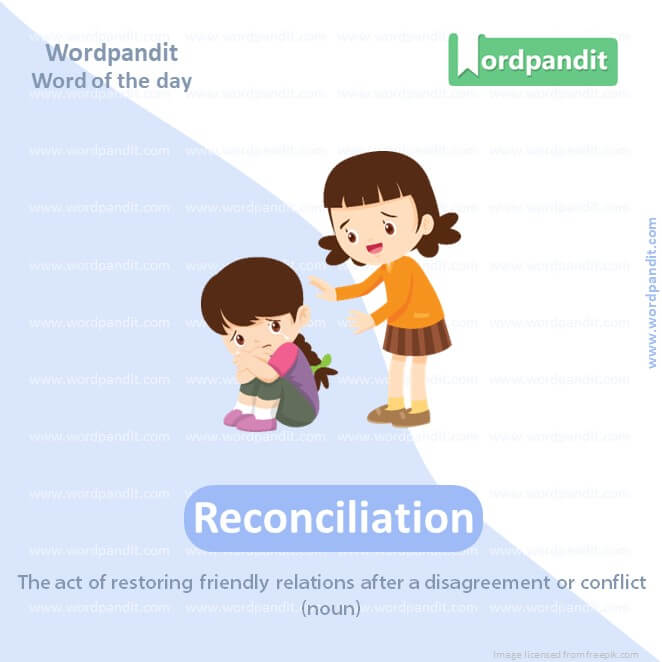
WORD-3: Reconciliation
CONTEXT: Where a truth and reconciliation commission restores confidence in Kashmiri Muslims and Pandits so that past scars can heal.
SOURCE: Hindustan Times
EXPLANATORY PARAGRAPH: Think about when you and your friend have an argument but then say sorry and start playing again. Reconciliation is like that. It’s when people make up after a disagreement and become friendly again.
MEANING: The act of restoring friendly relations after a disagreement or conflict (noun).
PRONUNCIATION: re-kon-sil-ee-AY-shun
SYNONYMS: Resolution, Settlement, Mending, Making up, Agreement
USAGE EXAMPLES:
1. They sought reconciliation after the long dispute.
2. The peace talks led to reconciliation between the two countries.
3. Reconciliation with his family was important to him.
4. The couple worked on reconciliation after their argument.
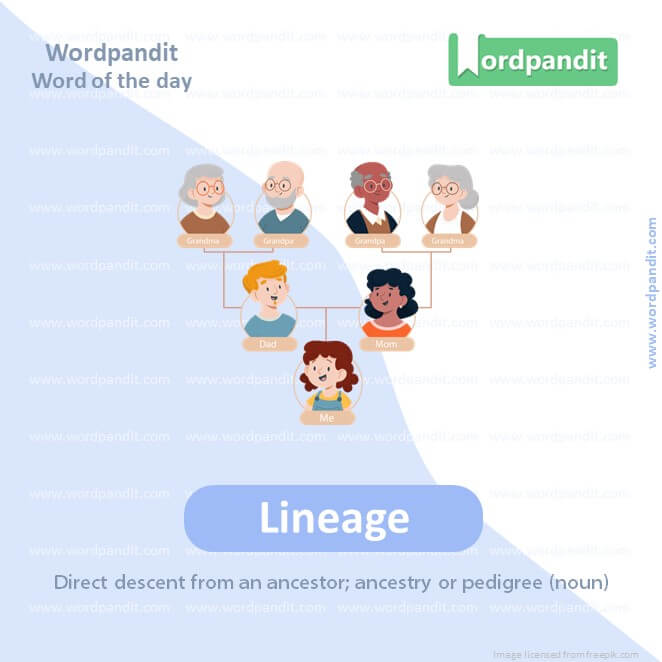
WORD-4: Lineage
CONTEXT: Where candidates are elected on merit not lineage, where family surnames don’t matter but character certainly does.
SOURCE: Hindustan Times
EXPLANATORY PARAGRAPH: Think about your family tree with your parents, grandparents, great-grandparents, and so on. Lineage is the line of family members that come before you, like a chain of who you are related to.
MEANING: Direct descent from an ancestor; ancestry or pedigree (noun).
PRONUNCIATION: LIN-ee-ij
SYNONYMS: Ancestry, Heritage, Bloodline, Descent, Family tree
USAGE EXAMPLES:
1. She is proud of her royal lineage.
2. The dog was of a purebred lineage.
3. They traced their lineage back several centuries.
4. His lineage played a part in his social standing.
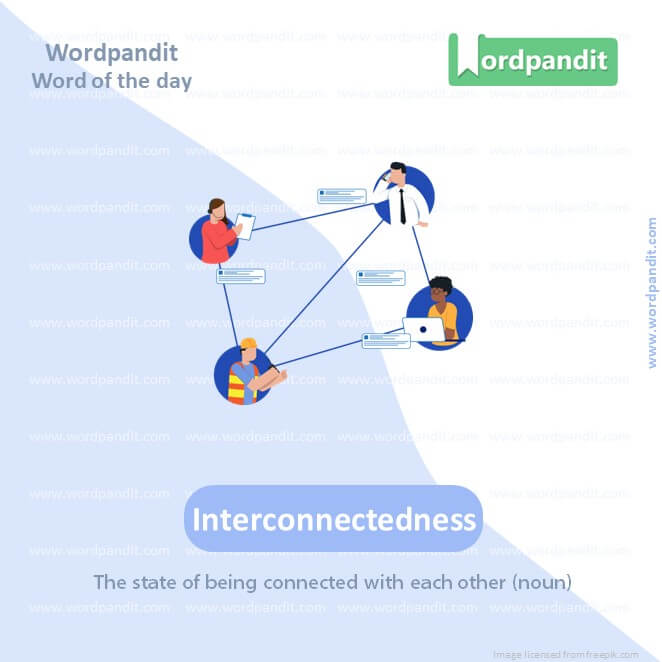
WORD-5: Interconnectedness
CONTEXT: Nurturing a balanced interplay of IQ, EQ, and SQ leads to holistic development, aligning the mind, heart, and spirit and fostering a sense of purpose, harmony, and interconnectedness with oneself, others, and the universe.
SOURCE: Times of India
EXPLANATORY PARAGRAPH: Imagine a spider web where all the threads are connected. Interconnectedness is like that. It’s when everything is connected to everything else in some way, like how friends in a group are linked together.
MEANING: The state of being connected with each other (noun).
PRONUNCIATION: in-ter-kon-NEK-ted-ness
SYNONYMS: Interrelation, Interdependency, Connectedness, Interlinking, Integration
USAGE EXAMPLES:
1. The interconnectedness of the global economy affects us all.
2. She studied the interconnectedness of nature and humans.
3. The internet has increased the interconnectedness of people worldwide.
4. The interconnectedness of the systems led to complex problems.
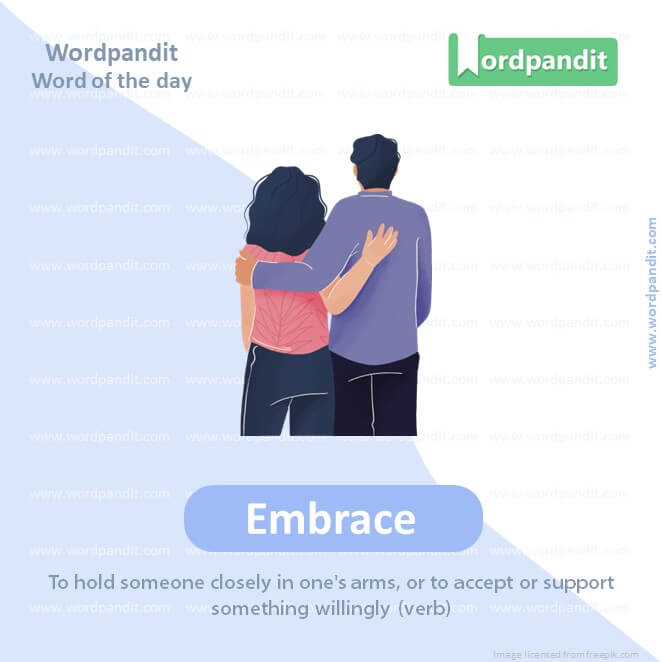
WORD-6: Embrace
CONTEXT: Where the Meiteis and the Kukis embrace each other with empathy and rekindle the spirit of a shared Manipuri identity.
SOURCE: Hindustan Times
EXPLANATORY PARAGRAPH: Think about giving someone a big hug. Embrace is like that. It’s when you hold someone closely in your arms, or when you accept something happily, like a new idea or change.
MEANING: To hold someone closely in one’s arms, or to accept or support something willingly (verb).
PRONUNCIATION: em-BRAYS
SYNONYMS: Hug, Hold, Accept, Welcome, Adopt
USAGE EXAMPLES:
1. They shared a warm embrace.
2. She decided to embrace the new challenge.
3. The community embraced the change positively.
4. The mother embraced her child lovingly.
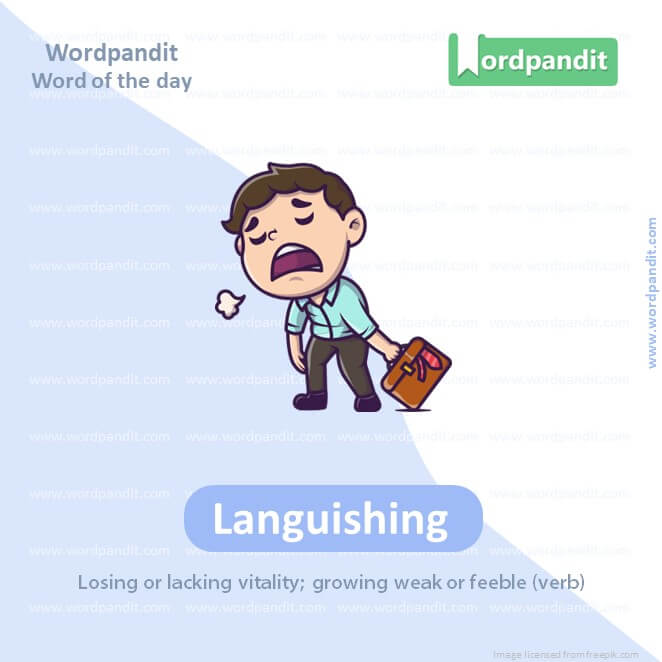
WORD-7: Languishing
CONTEXT: Where bail not jail is the mantra of the judicial system and accused persons aren’t kept languishing in prisons for years without trial.
SOURCE: Hindustan Times
EXPLANATORY PARAGRAPH: Imagine feeling really bored and sad because nothing exciting is happening. Languishing is like that. It’s when you’re not happy or active because you feel like you’re stuck and nothing interesting is going on.
MEANING: Losing or lacking vitality; growing weak or feeble (verb).
PRONUNCIATION: LANG-gwish-ing
SYNONYMS: Weakening, Fading, Withering, Deteriorating, Declining
USAGE EXAMPLES:
1. The plant was languishing from lack of water.
2. He was languishing in a job that offered no challenges.
3. The project languished due to lack of funds.
4. She felt like she was languishing during the lockdown.
WORD-8: Interpret
CONTEXT: the targeted vessel has no connections to Israel, which many interpret as an indication of the militants’ growing desperation.
SOURCE: Indian Express
EXPLANATORY PARAGRAPH: Think about reading a story and then telling it in your own words. Interpret means to explain or understand the meaning of something in your way, like how you might tell a story differently than your friend.
MEANING: To explain the meaning of something; to understand or translate in a particular way (verb).
PRONUNCIATION: in-TUR-prit
SYNONYMS: Explain, Translate, Understand, Construe, Decipher
USAGE EXAMPLES:
1. The teacher helped interpret the poem.
2. She can interpret Spanish into English.
3. Artists often interpret the world differently.
4. The law was interpreted in various ways.
WORD-9: Unaccustomed
CONTEXT: Maritime forces in the Indian Ocean are adept at fighting pirates, but many navies, including the IN, are unaccustomed to dealing with such radical militant tactics as those employed by the Houthis.
SOURCE: Indian Express
EXPLANATORY PARAGRAPH: Imagine eating a food you’ve never tried before. It might taste strange because you’re not used to it. Unaccustomed means not familiar with something or not used to it.
MEANING: Not familiar or used to something (adjective).
PRONUNCIATION: un-uh-KUS-tuhmd
SYNONYMS: Unfamiliar, Unusual, Uncommon, New, Unconventional
USAGE EXAMPLES:
1. He was unaccustomed to the cold weather.
2. They were unaccustomed to such luxury.
3. The team was unaccustomed to playing on grass.
4. She was unaccustomed to the city’s busy lifestyle.
WORD-10 Adjudicated
CONTEXT. Where politically sensitive cases are adjudicated without any bias or pressure. Where principles of natural justice must apply to every citizen and not just the powerful and influential.
SOURCE: Hindustan Times
EXPLANATORY PARAGRAPH: Think about a teacher deciding who won a race at school. Adjudicated is like that. It means to make a formal decision about something, like a judge in a court deciding who is right.
MEANING: Made a formal decision or judgment about a problem or disputed matter (verb).
PRONUNCIATION: uh-JOO-di-kay-ted
SYNONYMS: Judged, Decided, Determined, Resolved, Arbitrated
USAGE EXAMPLES:
1. The dispute was adjudicated by the court.
2. The competition will be adjudicated by a panel of experts.
3. The claims were adjudicated fairly.
4. He was adjudicated bankrupt by the court.
Vocabulary Words
When delving into the dynamic world of languages, the grandeur of ‘vocabulary words’ is all-encompassing. The importance of ‘vocabulary words’ in effective communication cannot be overstated; it’s these words that form the backdrop of any language, painting intricate pictures of thoughts and ideas.
Starting on the journey of learning ‘vocabulary words’, one should steer clear from rote memorization. The traditional structure of merely repeating words lacks the necessary context and application that actually embeds these words into your memory. To truly master the ‘vocabulary words’, one needs an integrated, immersive approach.
The first step towards mastering ‘vocabulary words’ is to engage with varied language mediums. Expanding beyond textbooks to read fiction, articles, blogs, and other forms of content not only diversifies your vocabulary but also acts as a mirror to reflect the practical application of these words. Essentially, you’re exposed to the words as they are commonly used, allowing you to truly understand their essence.
Empowering this journey, tech tools like language learning apps and memory-enhancing flashcards significantly aid in learning ‘vocabulary words’. These interactive tools provide a more engaging learning experience and hone word retention. Mnemonic devices, associating words with a unique story or visual image, enrich the process and make memory recall more efficient.
Practicing ‘vocabulary words’ by using them in day-to-day conversations exemplifies learning by doing. It also strengthens the neural pathways and improves overall word recall. This, coupled with regular revisions, ensures your grasp over ‘vocabulary words’ remains strong.
In conclusion, learning ‘vocabulary words’ is not just about adding words to your linguistic cupboard, but understanding their essence and utilizing them effectively. An inclusive approach to learning that combines diverse reading materials, technology tools, mnemonic devices and practice can really propel your mastery over ‘vocabulary words’. Remember, language is the bloodline of communication, and ‘vocabulary words’ are its heartbeat. ‘







